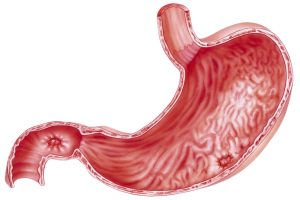
There are three types of peptic ulcers: gastric, esophageal, and duodenal. The different types of peptic ulcers describe where the ulcer is located, whether that is in the stomach, esophagus, or small intestine.
Many people believe that consuming high amounts of spicy foods can lead to peptic ulcers, but this is a myth and no truth stands behind it. Furthermore, stress does not lead to peptic ulcers either.
Signs and symptoms of a peptic ulcer
As mentioned, peptic ulcers are commonly caused by bacteria or erosion due to stomach acid. The most common bacterium that causes peptic ulcers is H. pylori. Other causes of peptic ulcers include frequent use of aspirin, ibuprofen, and other anti-inflammatory medications, as well as smoking, excessive alcohol drinking, radiation therapy, and stomach cancer.
The main symptom of a peptic ulcer is a burning sensation in the abdomen, which can be felt from the belly button up to the chest. This burning sensation can vary in intensity and may change from the moment you wake up to when you go back to sleep. In its early stage, a small peptic ulcer may be symptomless.
Other symptoms include:
Abdominal pain: This pain may start in the upper middle part of the abdomen, above the belly button and below the breast bone. This abdominal pain can feel like a burning sensation and may precede eating a meal. Abdominal pain as a peptic ulcer symptom can be temporary, lasting only a few minutes or several hours.
Dyspepsia: This refers to the common symptoms experienced with a peptic ulcer. Symptoms include bloating, feeling of fullness, hunger or an empty stomach feeling one to three hours after eating, or belching. Although common, these symptoms may not always occur in a peptic ulcer.
Ulcer pain: This pain can be described as burning, gnawing aching, or stabbing. If ulcer pain radiates to the back or up to the chest area, it can be quite distressing.
Emergency symptoms: Emergency symptoms of a peptic ulcer that should prompt you to seek medical attention immediately include tarry, black or bloody stool, severe vomiting, and severe abdominal pain with or without vomiting or evidence of blood.
Other symptoms of ulcers
Other symptoms of peptic ulcers include nausea, vomiting, loss of appetite, loss of weight unintentionally, and anemia because peptic ulcers can lead to bleeding.
When to see a doctor for peptic ulcers
You should see a doctor for peptic ulcers if you begin to experience any of the symptoms listed above. You should seek immediate medical attention for peptic ulcers if you experience any of the emergency peptic ulcer symptoms listed.